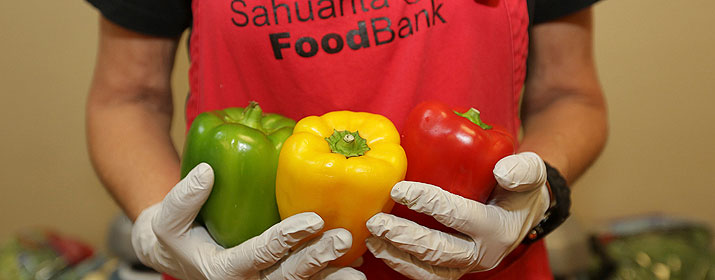
September is Hunger Action Month, a time for taking steps to address a critical community need that has grown even greater during the coronavirus pandemic.
About 15 percent of Pima County residents are food insecure, meaning they lack the financial resources for consistent access to enough food for active, healthy lifestyles, according to the Community Food Bank of Southern Arizona.
In recent months, as unemployment levels have spiked, food banks and organizations have experienced sharp increases in requests for food and deliveries. Our company and volunteers have joined other community leaders in stepping up to respond to this need.
“The need is greater than ever before as the pandemic continues to create stress on the most vulnerable members of our community,” said Cathy Bradley, Senior Director of Human Resources for TEP and a board member of the Community Food Bank of Southern Arizona. “I’m so proud of TEP and the generosity that our employees demonstrate in support of our community.”
Here are a few ways we have worked to make a difference:
Food Deliveries
In March, TEP volunteers responded to a critical call from the Pima Council on Aging to deliver meals to elderly and disabled Green Valley residents who faced financial and health hardships. Within three weeks, requests for meal deliveries tripled at La Posada at Park Centre, a community that includes both independent and assisted living housing.
The council partnered with Catholic Community Services and the food bank’s Caridad Community Kitchen.
Early every Monday and Wednesday morning, volunteers picked up frozen food packages from the kitchen and drove them to La Posada. From there, residents received meals from drive-up or delivery service. Volunteers would organize the remainder of meals, which weren’t picked up at La Posada, and often helped deliver them to other low-income families in the Green Valley area.
Wendy Erica Werden, TEP Manager of Community Investment and Philanthropy, drove a large TEP van to maximize space for the meals – about 100 every Wednesday. Other volunteers joined her.
“The increase in need across our territory is overwhelming, and it’s so important to me to help take care of others when I am able,” said Nicole Hopkins, TEP Innovation Program Manager. “I’m also grateful to be able to work for a company that is so invested in the community.”
Lynn Borders and other volunteers brightened up the meal packages with handmade cards and greetings, since some of the seniors have little or no contact with outsiders. Hopkins, a Girl Scout troop leader, also asked local Girl Scouts to send cards.
Beginning in the spring, Borders started making and donating handmade cards as a volunteer activity for a local church. Later, fellow TEP employees joined in by writing greetings in her cards for seniors. She has donated nearly 450 cards since the start of the pandemic.
“I’m accustomed to volunteering and I really miss it,” said Borders, a Business Relationship Manager. “We all need to limit our social interactions, but this is something I can do.”
Feed Tucson Event
This summer, TEP volunteers helped distribute food boxes and household supplies to almost 1,300 families at the Feed Tucson 2020 event.
Tucson community leaders Bob and Beverely Elliott spearheaded the event to bring the Tucson community together for positive collaboration to support families in need, along with the NBA Retired Players Association-Phoenix Chapter and local sponsors, including TEP. Bob Elliott serves as board chair of UNS Energy, TEP’s parent company.
Feed the Children, a nonprofit focused on alleviating childhood hunger, provided four truckloads of food and household supplies for the June 25 event at Kino Stadium.
Watch a video of the Feed Tucson event.
Community Grants
To help charities meet increased needs during the pandemic, TEP made a $500,000 donation to the COVID-19 Community Support Fund through the Community Foundation for Southern Arizona (CFSA). Together with funds from other donors, the foundation has provided grants to a variety of nonprofits, including those that aim to alleviate hunger. Some recipients include:
- Community Food Bank of Southern Arizona, $20,000 grant: After the pandemic hit, the food bank quickly increased its local emergency food distributions from 300 households a day to more than 700. The funds were designated for food, supplies and logistics for drive-through distributions.
- Interfaith Community Services, $20,000 grant: While the demand for food increased by more than 40 percent by early April, donations were not keeping up with the needs. The funds provided 14-day emergency food boxes for homebound seniors, as well as food for the group’s two banks.
- Sahuarita Food Bank and Community Resource Center, $20,000 grant: With the demand doubling in the first few weeks of the pandemic, the food bank purchased food, paid for vehicle maintenance for increased deliveries and hired a Spanish-language interpreter and temporary staff to cover work normally done by volunteers. Most volunteers are over the age of 60 and were unable to continue their tasks. Food distributions include weekend nutrition backpacks for children during the summer and into this school year while remote learning continues.
“Without the grant help and other support, we could not have kept up with demand,” said Curt Keim, Vice President of the Sahuarita Food Bank. “This has truly been a community effort that demonstrates the best of our society.”
More information about our philanthropic efforts is on our website.
This story is part of our ongoing series highlighting one of TEP’s philanthropic focus areas – community assistance. TEP works with non-profit partners to develop invitation-based donation requests for community assistance. Funds come from corporate resources, not customers’ rates. Learn more about donations.






